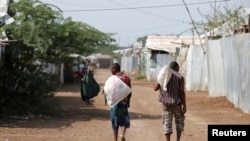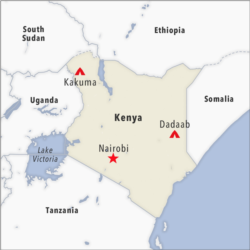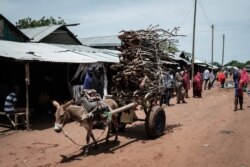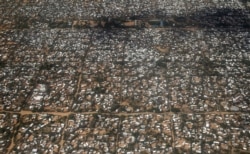Refugees in Kenya and their supporters are hailing a Kenyan court's decision to temporarily halt a government effort to close two camps in the country.
In March, Kenya's interior ministry demanded the U.N.'s refugee agency (UNHCR) plan to close the Dadaab and Kakuma camps, which are home to about 400,000 refugees and asylum-seekers — mainly from Somalia and South Sudan. The ruling is the second time a Kenyan court has stopped authorities' attempts to close the camps.
Somali Abdullahi Ali, 37, has been living in the Dadaab refugee camp since 1992, when he fled Somalia's civil war. He met his wife in the camp, and they now have seven children.
He welcomed the Kenyan high court's order Thursday to suspend the government move to shut down Dadaab, in the country's east, and Kakuma, in the northwest. The court has seen that it's not easy to close the camp and send refugees home in a short period, Ali said.
The court ordered the 30-day halt after lawyer Peter Gichira filed a legal challenge to the interior ministry's plan to close the camps.
The ministry had given the UNHCR until Wednesday to develop a plan to close the camps. The UNHCR on Friday said it had shared its proposal with the Kenyan authorities.
The statement said the plan included voluntary repatriation, in accordance with COVID-19 health protocols, and resettlement to third countries for refugees who cannot return for safety reasons.
Kenya's interior ministry, which is in charge of refugee affairs, has not responded to requests for comment. But Kenyan media report the ministry is not happy with the UNHCR's proposal.
Constitutional lawyer Bob Mkangi said Kenya cannot ignore local and international laws that protect the rights of refugees.
"But also, to go ahead and do it would be very difficult considering these refugee camps house over 400,000 people, and to simply say you are closing them down is a huge logistical undertaking that cannot be done whimsically," he said.
The Kenyan government has insisted the refugee camps pose a security threat, and since 2014 have sought to have them closed.
But Irungu Houghton, head of Amnesty's International Kenya office, said the time is not right to close the camps.
"Obviously, this is not a good time for Somalis, South Sudanese, Ugandans, Tanzanians," Houghton said. "We are seeing in the case of Tigray in Ethiopia a new front of violence has opened up and for many of those refugees they are not assured of their safety or protection they require in order to return."
Houghton also noted that many refugees have not received coronavirus vaccinations, so moving them in large groups would risk further spreading the virus.
Kenya's Kakuma and Dadaab refugee camps have been open for close to three decades.
At the height of conflicts and famine in Somalia, the Dadaab camp hosted more than 600,000 people, most of them Somalis.
Since 2014, more than 80,000 Somali refugees have returned home from Kenya under the U.N.'s voluntary repatriation program.







